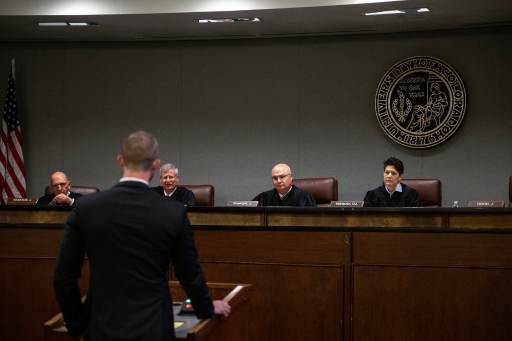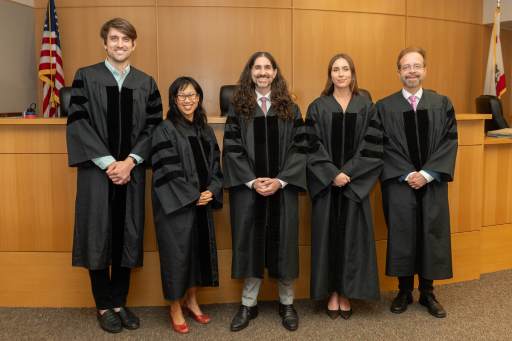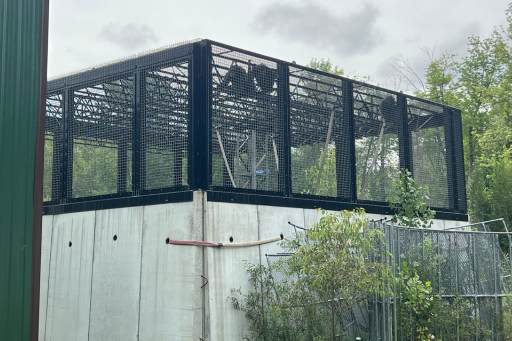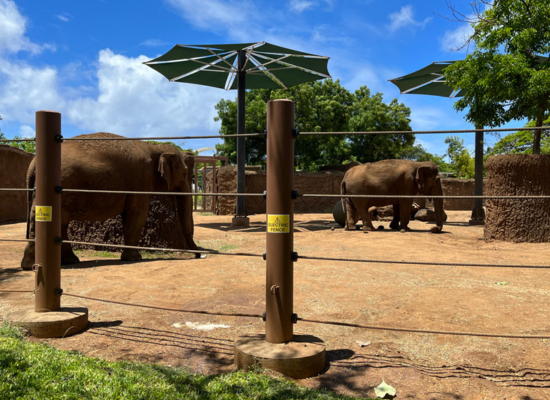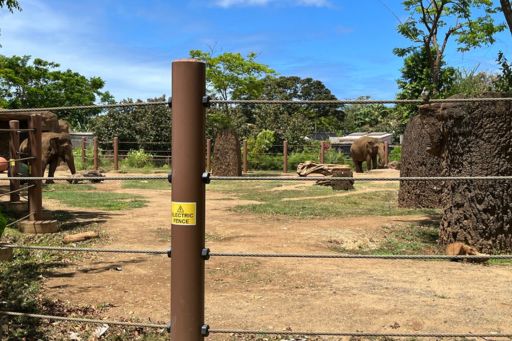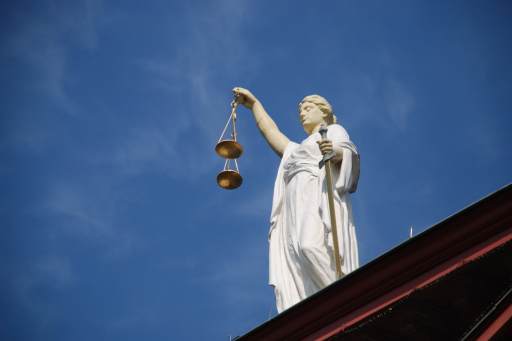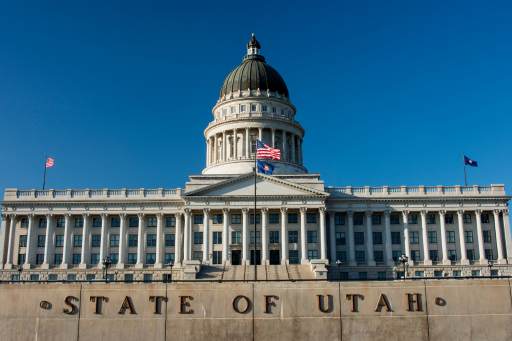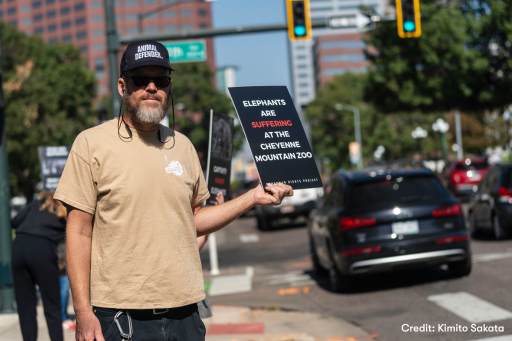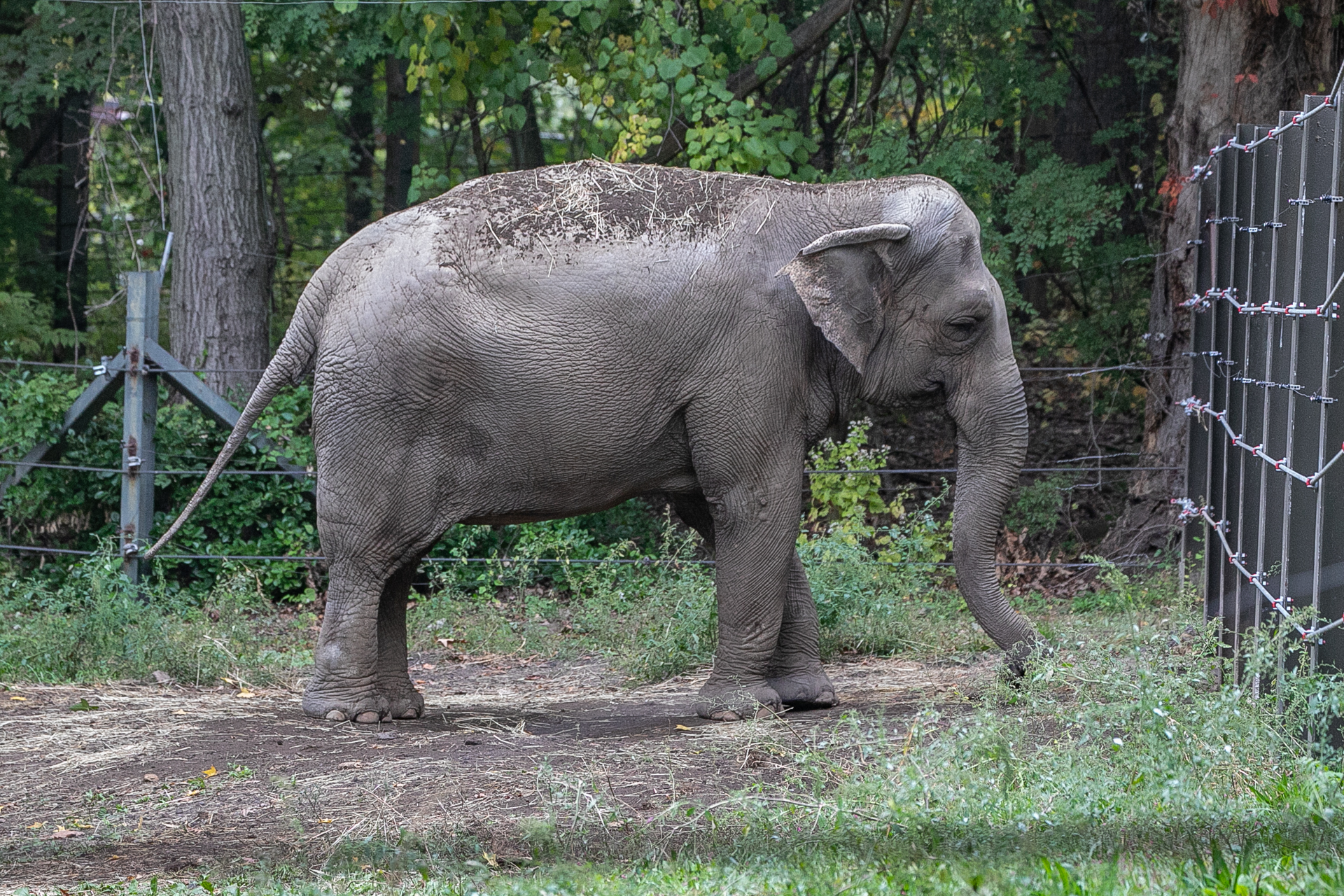The NhRP’s lawsuits are the first and only lawsuits to demand nonhuman animals’ right to liberty. In 2024, not only did we have more clients than ever before, but all our active cases were fully briefed. This is important because it positions us strategically for oral arguments and final decisions in 2025, which allow us to keep pushing the envelope on the question of legal rights for animals.
2024 Highlights and Impact
2024 Highlights and Impact
Advancing nonhuman rights in court
In 2024, five of the NhRP’s elephant clients became the first nonhuman animals in Colorado and the American West to have a hearing on whether they are entitled to a legal right: specifically, the fundamental right to liberty protected by the common law writ of habeas corpus.
The hearing took place in Colorado’s highest court on a sunny October day as over 200 people looked on, including NhRP supporters, local media, and professors and law students from the University of Colorado Law School (invited to attend as part of Colorado’s “Courts in the Community” program). Over the course of an hour, the judges asked probing, pointed questions of both NhRP Senior Staff Attorney Jake Davis (arguing on the elephants’ behalf) and John Suthers, former US Attorney for Colorado and former mayor of Colorado Springs (arguing on the zoo’s behalf). As Jake emphasized, the elephants held captive in the Cheyenne Mountain Zoo shouldn’t be deprived of justice simply because they aren’t human.
Three months after this hearing, the Colorado Supreme Court upheld a lower court’s dismissal of the elephants’ case, concluding that the state’s habeas corpus statute applies only to humans “no matter how cognitively, psychologically, or socially sophisticated” a nonhuman animal may be. In so doing, the Colorado Supreme Court incorrectly deferred to the legislature to limit the scope of the common law of habeas corpus, which is a critical judicial safeguard of civil liberties dating back to the Magna Carta.
Despite the Court’s decision, the elephants’ habeas hearing remains an important mark of progress for animals: not only because, for the purpose of the hearing, our clients were treated like someone rather than something, but also because it gave us another opportunity to directly challenge an unjust system. This case, like other NhRP cases, involves directly representing our nonhuman clients to stop an ongoing injury to their right to liberty. The injury under consideration was the elephants’ own. By contrast, virtually all other animal law cases are technically brought on behalf of human interests. The Cheyenne Mountain Zoo elephants’ case presented a question that hadn’t been asked before in Colorado: if liberty is such an important value in our legal system, why must it be withheld simply because an individual isn’t human? Asking this question–and pressing for an answer–is itself a form of progress.
Overall, this hearing signals that the issue of legal rights for nonhuman animals has become a significant and important question that courts may not reflexively dismiss and that there’s room in our legal system to answer the question of whether nonhuman animals have an interest in liberty that should be protected by the courts.
Go Deeper
In Michigan, where the NhRP is arguing for the right to liberty of seven chimpanzees held captive in a roadside zoo, we began the year by appealing a trial court judge’s denial of our case because she believes chimpanzees aren’t legal persons under Michigan’s common law of habeas corpus. Our appellate brief argues that the relevant common law habeas corpus statute doesn’t prevent the Circuit Court from allowing the case to proceed, as the judge believed it did. The NhRP’s brief also argues that the Circuit Court violated its own specific duty under the common law to protect autonomy and ensure even-handed application of the law. This duty is separate and distinct from the Michigan courts’ ultimate duty to issue our requested habeas corpus order, i.e. hold a hearing on the merits of our clients’ case and what our petition makes clear is their unlawful imprisonment. We expect oral argument on our Michigan appellate brief to take place sometime in 2025.
Go Deeper
We began the year in Hawaii by arguing before Judge Gary W.B. Chang on behalf of Mari and Vaigai–two elephants held in captivity in the Honolulu Zoo.
In late 2023, the City and County of Honolulu, which oversees the zoo, filed a motion asking the First Circuit Court to dismiss the elephants’ case. Judge Chang then ordered oral arguments on the zoo’s motion and our opposition to it. It’s relatively rare for oral arguments to be ordered on these kinds of motions. This hearing thus represented an important opportunity, at a very early stage in the case, to argue in person that the zoo’s motion to dismiss must be denied and that the judge must issue an Order to Show Cause, requiring attorneys for the City and County of Honolulu to come to court to try to justify the imprisonment of Mari and Vaigai.
The 45-minute hearing went well in the sense that Judge Chang asked exactly the kind of probing, thoughtful questions we hope for in all our cases–questions that indicate how seriously courts are now taking the issue of nonhuman animal rights. Adopting a philosophical approach to the issues raised, Judge Chang allotted more time for the hearing than expected, which allowed all the core arguments to be discussed to some degree.
Unfortunately, Judge Chang granted the zoo’s motion to dismiss the case because, similarly to the trial court judge in our Michigan chimpanzee rights case, he believed habeas corpus is limited to humans. As we maintain in our appeal, the writ is not so limited; its protections can and should be extended in order to remedy the unjust imprisonment of beings like Mari and Vaigai. We expect oral argument on our Hawaii appellate brief to take place sometime in 2025.
Go Deeper
In any civil rights struggle, resistance to legal change–especially on the part of those who benefit from an unjust status quo–is expected, especially when change is already underway. That’s why we weren’t surprised when, in early 2024, the Utah legislature passed a bill, H.B. 249, that categorically strips the authority of courts to recognize the legal rights or duties of certain nonhuman entities. Nonhuman entities impacted by the Utah law include nonhuman animals, land, bodies of water, and artificial intelligence. Interestingly, corporations aren’t explicitly listed in the statute.
According to the author of the bill, the purpose was to “define personhood as a human being.” He also cited the progress made by the NhRP in Happy the elephant’s case in New York as one reason for the bill’s introduction.
Upon learning of the bill, we immediately encouraged our Utah supporters to contact their state senators to urge them to oppose it. Several local groups, including those fighting for Utah’s Great Salt Lake to be recognized as a legal person, did the same. The bill passed anyway. We subsequently determined it was important for us to file a lawsuit challenging the constitutionality of this anti-rights law, which sets a dangerous and unconstitutional precedent that the legislature can take away the ability of courts to exercise independent judgment to protect legal rights, including civil liberties. In July of 2024, we notified the State of Utah of our intent to sue and spent the following months preparing to file suit in early 2025. We’re asking Utah’s Third Judicial District Court to strike down the law because it violates constitutional separation of powers.
Fostering change beyond the courtroom
While litigation remains at the heart of our mission to secure legal rights for animals, real, lasting change requires the building of a movement—one that shapes public opinion, inspires legal professionals, engages policymakers, and mobilizes communities. Through legislative advocacy, grassroots organizing and advocacy, media and educational outreach, and coalition building, we’re creating the societal and legal foundation for a world where nonhuman animals are recognized as individuals with fundamental rights. Our efforts beyond the courtroom strengthen every case we bring and move us closer to a legal system in which members of other species have access to justice.
One powerful example of how we’re building this broader movement took place in Colorado ahead of our hearing on behalf of the elephants held captive in the Cheyenne Mountain Zoo. In a rally organized by the NhRP in partnership with local animal advocates, about four dozen Coloradans gathered at a park in Denver across from the Colorado Supreme Court to call for freedom for Jambo, Kimba, LouLou, Lucky, and Missy. Virtually every television news outlet in the area covered the rally. CBS News Colorado and Denver7 News both aired multiple clips of the elephants swaying in the zoo’s elephant exhibit, including a video the NhRP filmed of Jambo alone in a cell inside the zoo’s elephant barn the day before. Behavioral ecologist, elephant scientist, and Colorado resident Dr. Mickey Pardo, who spoke at the rally, explained to Denver7 News that this swaying is “an indication of really severe chronic stress. It’s not something that we want to see in any animals, and we never see it in wild elephants.”
This rally, like others before it, brought our mission from the courtroom to the community, with NhRP supporters coming together to raise their voices—and signs—in support of captive elephants’ right to liberty. In the words of one rally attendee, “Being a Denver resident and a Colorado resident for over 30 years, I’m appalled and sickened by what we’ve done to these elephants.”
Our grassroots advocacy and media outreach generated significant interest in the hearing as reflected in widespread local and national media coverage. Internationally, outlets published articles on the case in their own local languages, further highlighting the importance of the elephants’ hearing and case.
Go Deeper
In the weeks before the Colorado hearing took place, we also connected with area law students, sharing our mission and work in the form of two NhRP-organized lunch-and-learn events: one at the University of Denver Sturm College of Law and one at the University of Colorado Boulder School of Law. Today’s law students are tomorrow’s clerks, lawyers, judges, and legislators. Informal, accessible events like lunch-and-learns offer a unique opportunity to introduce the next generation of legal professionals to the concept of nonhuman rights and our approach to achieving them. They also invite continued engagement on the part of attendees. We look forward to organizing more of these kinds of events in the future.
Throughout 2024, our team participated as speakers and attendees in a range of in-person and online events that allowed us to highlight the uniqueness of our approach to securing legal rights for nonhuman animals, the progress we’ve made, and how we’ve met the obstacles we’ve faced. Collectively, these events can help shape the future of animal rights advocacy. Audiences included bar associations, law schools, university classes, university panel discussions, the Performing Animal Welfare Society’s International Captive Wildlife Conference, the Brooks Congress, and the Canadian Animal Law Conference. By sharing our expertise, strategies, results, and challenges, as well as learning from colleagues in the movement, we help build a stronger, more informed, and united movement for legal change for nonhuman animals.
In 2024, the NhRP’s legal team, grassroots advocacy team, and communications team worked closely together not just in Colorado but also in New York, where we continue to advocate for the release of elephants Happy and Patty from the Bronx Zoo to a sanctuary. In the summer of 2024, it became clear through our routine monitoring of the Bronx Zoo elephant exhibit that Happy hadn’t been outside in at least a week, likely longer. Elephant behavior is never normal in captivity, but this development was especially abnormal. During past years in the summer months, Happy was seen outside almost daily.
In July, we filed a complaint on her behalf with the USDA and publicly shared our serious concerns about what appeared to be Happy’s confinement to the zoo’s elephant barn. In August, The City—a digital news platform dedicated to hard-hitting, high-quality, and high-impact accountability reporting—published the first of two stories about Happy’s disappearance, the first one with reference to our USDA complaint. The Bronx Zoo and the Wildlife Conservation Society, which manages the zoo, finally issued a statement in response to the growing public outcry. Unsurprisingly, they claimed that nothing was wrong with Happy–that she was choosing to stay indoors. Further coverage followed, including by The New York Post, The New York Times, and Inside Edition.
From the filing of Happy the elephant’s case, to two judges on New York’s highest court writing dissenting opinions in support of her right to liberty, to our continued media outreach and grassroots advocacy on her behalf, the plight of “New York’s loneliest elephant,” as The New York Times has called her, continues to reinforce the need for recognition of elephants’ right to liberty. Meanwhile, our campaign for her freedom continues, with a focus on urging the New York City Council to pass Intro 213–an elephant captivity ban we helped develop that would require the Bronx Zoo to release Happy and Patty to a sanctuary and close its elephant exhibit. This bill was reintroduced in February of 2024 and has been referred to the health committee for further consideration.
Go Deeper
NY Post
Activists say ‘clearly something is wrong’ as Happy the Elephant is still ‘missing’ from Bronx Zoo
In 2024, unique, powerful storytelling also served as the foundation of our Free to Be Elephants initiative. This comprehensive effort educates the public about the extraordinary cognitive, emotional, and social complexity of elephants, how they suffer in even the “best” zoo, and why they need the right to liberty. Ultimately, this campaign aims to end elephant captivity in US zoos, driven by widespread recognition of elephants’ right to liberty.
Centered on an interactive, information-rich online portal that is the first of its kind for elephants, Free To Be Elephants documents the story of every elephant held in a zoo accredited by the Association of Zoos & Aquariums (the single biggest exploiter of elephants in the US) and provides up-to-date information on which zoos are engaging in unjust practices like captive breeding and the international elephant trade. The portal now includes profiles for every elephant held captive by the AZA, and we featured ten elephants’ stories in our email newsletter and on our social media channels. In 2024, we also began to incorporate grassroots advocacy tools into the website. This resource serves as both an educational tool and a model for how comprehensive storytelling and data collection can create the informed public awareness necessary for judges and lawmakers to recognize nonhuman rights and create lasting legal change.
Exploring new opportunities for change
As we continue our mission, we're investigating and beginning to pursue additional ways to support and strengthen the legal foundation for securing fundamental legal rights for nonhuman animals.
In 2024, we began to identify, research, and pursue new strategic opportunities for legal change. Historically, we’ve executed our mission through advocacy surrounding habeas corpus cases, arguing that chimpanzees and elephants have a common law right to liberty that precludes their being kept in an environment that deprives them of their liberty, like a zoo or a traveling circus. This work will remain at the core of our legal efforts. However, our vision is much broader–encompassing systematic legal change that recognizes nonhuman animals as individuals with rights, which may be supported by enhancing the legal status of nonhuman animals in other ways.
Fulfillment of the NhRP's vision means maintaining what we see as a careful balance: boldly challenging a human-centric view of the law and the suffering that results from it, while also demonstrating that legal rights for nonhuman animals aren’t radical or extreme. Rather, nonhuman animal rights constitute a natural, obvious evolution in the law, in keeping with what most people believe to be morally right and morally wrong. In other words, societal norms regarding the treatment of nonhuman animals have changed–and the legal framework for nonhuman animals needs to change with them. The research we began in mid-2024 essentially asks, “What new types of cases or campaigns are most likely to succeed based on our assessment of evolving norms? What are new ways we can urge judges and elected officials to update the legal framework to consider and protect nonhuman animals’ interests?” We expect to begin integrating the results of this research into our work in 2026 and look forward to sharing more as it takes shape.
In 2024, we expanded into a new area of legal work for the NhRP: providing amicus support in a companion animal case. In an amicus brief, a party not directly involved in an active court case asks to advise the court regarding a matter of law. In August we filed an amicus brief in Deblase v. Hill, which concerned a claim of infliction of emotional distress by a woman who was walking her son’s dog and witnessed the dog getting struck by a car in front of her. In New York, where the case was filed, plaintiffs can sue for infliction of emotional distress if they suffer harm from witnessing an immediate family member getting injured while in the “zone of danger.” Amicus briefing at the trial court level is highly unusual, but the court felt it was warranted in this instance. We argued that justice and the flexible nature of the common law require allowing the plaintiffs to recover emotional damages for having witnessed Duke’s death.
While Deblase v. Hill isn’t a habeas corpus case or one about securing rights for nonhuman animals, we filed an amicus brief because it involves issues highly relevant to the NhRP’s work, specifically the evolving legal status of nonhuman animals, the role and duty of common law courts, and the fundamental demands of justice driven by evolving societal norms. We also filed a rebuttal to a brief filed by the American Veterinary Medicine Association and other groups that hypocritically argues dogs can’t be “immediate family” for purposes of New York’s zone of danger rule.
As we argued, there are two anachronistic reasons for excluding the family dog from one’s immediate family: (1) dogs are not members of the species Homo sapiens, and (2) dogs are merely personal property, akin to inanimate objects like pencils, tables, chairs, and toasters. As both reasons reflect arbitrary, irrational, and unfair thinking, they must be rejected as antithetical to justice. In June of 2025, Justice Aaron D. Maslow of the Kings County Supreme Court issued a decision affirming that dogs can be recognized as immediate family members under New York law. He relied extensively on the NhRP's briefs in his decision.
We expect to engage in more of this kind of work in the coming months and years. We’re still in the early stages of exploring new opportunities for legal change for nonhuman animals, but the possibilities are exciting—and we’re laying the groundwork now for the breakthroughs of tomorrow. Together, with your support, we’re imagining a legal future where more animals are seen not as things, but as beings with rights who deserve access to justice.
Press Highlights
2024 By the Numbers
NhRP lawyers might be the ones headed to court, but our supporters’ passionate investment in our mission is what makes the fight for nonhuman rights possible. This includes the time you take to advocate for our clients, the news stories you share, the events you attend, and the donations you make to help keep the fight going.

